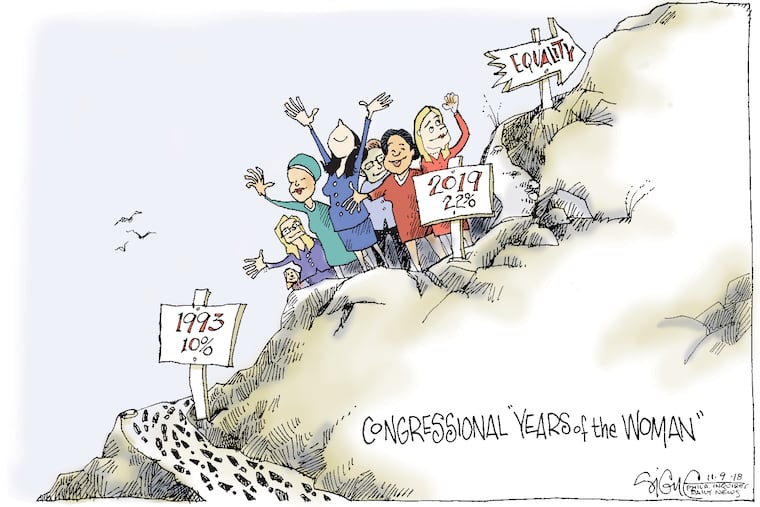
I was as relieved and happy as anyone to see this year's extraordinary new female members of Congress elected across the map. Even in Oklahoma! Go, Sooners! Women may now have (drum roll) a whole 22ish percent of the seats in the House of Representatives!
Yes, it's progress, but it reminded me how excited everyone was after the 1992 election, where the U.S. Senate would have a whole six women out of the chamber's 100 members. When it was called "the Year of the Woman" back then, Sen. Barbara Mikulski aptly quipped: "Calling 1992 the Year of the Woman makes it sound like the Year of the Caribou or the Year of the Asparagus. We're not a fad, a fancy, or a year."
When progress was slow thereafter, I drew a cartoon after the 1994 elections to express my impatience.
Slow forward 24 years to this Tuesday, with at least three new women elected to the U.S. Senate, while two women lost their seats. So that chamber, too, will remain about 20 percent female. Glad as I was about that, my first impatient instinct on Wednesday morning was to look at the results as a glass still only one-fifth full.
Then I took a breath.
Though it's true we still have a long way to parity, looking at the diverse group of women winners — including the first Muslim congresswomen, the first Native American congresswomen, the first Latina congresswomen from Texas, the first lesbian mom in Congress, Massachusetts' first black congresswoman, Connecticut's first black congresswoman — I couldn't help feeling hopeful that the next generation of young women will continue to be actively engaged in representative government. Given that among the new faces are stiff conservatives like Tennessee's new senator, Marsha Blackburn, pro-Trump men should feel represented, too.
I also remember that the early pioneers of women's rights in this country like Lucretia Mott and Susan B. Anthony never lived to see women get the vote. Gloria Steinem may never see an Equal Rights Amendment or a woman president. But that arc is bending for women as well as for people of diverse colors and creeds.
Here's to those working hard so that it continues.
Signe Wilkinson is the Inquirer's editorial cartoonist.